

Contributor
- Topics: Archive, Inspired Gardens & Design
Co-founded by Dan Hinkley and Robert Jones in 1987, Heronswood is a remarkable, and once famous botanical garden in the Pacific Northwest. Today, under the stewardship of the Port Gamble S’Klallam Tribe, a small gardening staff directed by Dan, and a dedicated cadre of volunteers, the garden is being rebirthed. Recently, Dan, Sam Decker, one of the garden’s keenest—and at 12-years-old certainly the youngest—volunteer, and Sam’s father, Dan, chatted around the kitchen table at Windcliff. The topic: Sam’s likes and dislikes, his goals and aspirations, and what it takes to be a good gardener.

A conversation between American plantsman Dan Hinkley and emerging horticulturist Sam Decker.
DH: Ok, Sam, I have come to know you as one of our most knowledgeable volunteers at Heronswood during the past three years. How did this passion you possess for horticulture begin?
SD: Well, I was born in Overland Park, Kansas, and I spent the first five years of my life there. But it was Kansas! You can’t grow anything there but what I think of as “grandma’s plants.” Boring.
DH: What was your first memory of gardening?
SD: I planted an apple seed from the kitchen. (DD: And he put worms all around the seed in the ground to help germination.)
DH: I know your father has been very supportive of the passion you feel about growing things. Was it him who inspired you to plant the apple seed?
SD: No, it was my Grandma. She loves to garden.
DH: Does she grow “grandma’s plants”?
SD: Yeah, Hostas. Lots of Hostas. But my mom studied floral design and worked as a florist. It wasn’t gardening, but I think I learned how to put plants together from her. It was more about design.
DH: So, way back in 2010…
SD: Yeah, we moved to Washington. I remember thinking how lush and green and beautiful everything was. I guess I got hooked on plants. Our family went hiking every Sunday after church. I remember seeing the orchids—especially the saprophytic species like Corallorhiza but even Goodyera—and I wanted to learn all I could about them.
DH: How did you go about that?
DD: “The Book”
SD: Dad and Mom bought me a book, Plants of the Pacific Northwest Coast. It became a game to identify as many plants as we could during each Sunday hike; I started to understand plant names and they began to stick in my memory.
DH: So how did this new love of wild plants translate into making a garden?
SD: Well, my parents bought a house near Kingston; the landscape was pretty much nothing. I mean, like Spirea and Primula vulgaris planted in a bunch of mulch and rocks. It was pretty stupid looking.
DD: We gave him the least desirable part of the garden to play in.
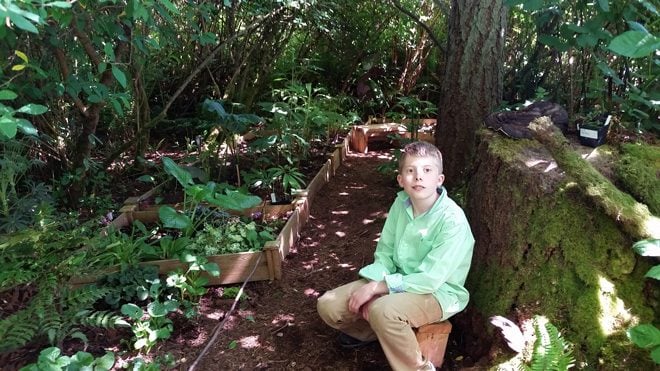
SD: Yeah (laughing) they did. It was all shade and sand and no water whatsoever.
DD: (also laughing) It was a terrible site. We thought he would get bored with the process while we concentrated on creating a traditional landscape around the house.
DH: So, how did that turn out for all of you?
SD: Well, I all I had to work with was native plants that were already there, so I wanted to create something that looked and felt natural. I don’t like things formal; I have a kind of philosophy against formal gardens. Now I think my area of the garden is the most beautiful part of my parent’s landscape.
DD: It is, no doubt. Sam really showed his mom’s talents. His garden is beautiful. Sam has a natural affinity for placing plants. He understands color, texture, and basic design principles. It’s pretty impressive.
DH: Tell me about one of your favorite plants that is blossoming right now? [Ed: this was in mid-May]
SD: Asarum caudatum. It is our native ginger. Its flower is just so beautiful and fascinating. I got really excited the first time I saw it in blossom.
DH: Asarum are pretty cool; especially the Asian species, but I like our natives too. Any idea what plant family they are in?
SD: (without hesitation) Aristolochiaceae
DH: And do you have any idea what happens if you move the first of the genus Asarum to the end.
SD: (momentary hesitation ) Oh yeah, Saruma henryi. I love that plant. It blossoms for us for about 9 months.
DH: So tell me about a typical day in the life of Sam Decker.
SD: Well, I wake up at 6:30 and walk in my garden before I go to school. I get home from school at about 4:00pm and work in the garden until we eat at about 7:30pm. Sometimes I just take books out into the garden and read.
DH: What do you like to read?
SD: Mostly about plants, but I like novels too; books about animals.
DD: He actually does do that a lot. Sam loves to study about the plants he is growing. I wish I were more like that. He truly enjoys the garden and uses it to learn.
DH: So, how many hours are you spending out there each week?
SD: Well, I don’t really keep track but I guess I must be in the garden for about 16 hours during the week (DD: interjecting, 20), and then all day on weekends, except for church and our hike afterward. And then one day Saturday a month I volunteer at Heronswood.
DH: Do you like to weed?
SD: Well, I guess it is not the best job, but you do get to get really close to the plants and take the time to see the details. I was weeding Digitalis the other day and looked up to see the brand new growth of Metapanax delavayi. I was like “Wow!” I wouldn’t have noticed it if I wasn’t down on my hands and knees and looked up. So, yeah, I guess weeding is pretty important way to get to know the plants.
DH: Well, is it all plants all of the time? Any other interests?
SD: I like woodworking, hiking and track. Yay Seahawks! And Michigan basketball.
DH: I suspect you mean Michigan State basketball, Spartans, right? Green and White?
SD: (laughs)
DH: Lets look head 30 years. What is Mr. (Dr.?) Sam Decker going to be doing when at the ripe old age of 42?
SD: I think I want to be a nurseryman. I love to cultivate plants and propagate. I will probably go to college (DD: interjects, Will go to college), but I really just want to grow plants. And I like to teach too; give presentations and tours through my garden. I think I want to explore for plants, too.
DH: You have already given three presentations to garden clubs and you are about to give one to your entire school. Do you get nervous?
SD: No, I really don’t seem to get nervous because I like plants and know quite a bit about them. So I want others to know about them too. I guess sometimes I think I have to remember to dumb my presentations down a little.
DH: So, I already know the answer, because all I have heard about for the past three years are Aroids. Aroids, Aroids, Aroids. Boring… But go ahead and tell me about your favorite plant at the moment.

SD: Not just now, always: Aroids. I think there should be an updated Arisaema book, a new edition, because there are so many new species and too many synonyms. There should also be a book on Aroid cultivation.
DH: But there are other fish in the pond. Anything on the horizon that is catching your interests?
SD: Yeah lots. Asarum and the Lardizabalaceae (Holboellia, Stauntonia, Lardizabala, Akebia) and a lot of the hardy vines. I like Clematoclethra, and all of the Araliaceae, you know Schefflera, Metapanax, Pseudopanax, Sinopanax, even Panax. Now I am starting to explore the Proteaceae; Grevillea, Embothrium, Telopaea, Hakea, Protea, Banksia. They are so cool.
DH: Any advice you want to give anyone just starting to explore the entire universe of gardening?
SD: I would say get to know local nurseries, get three different plant encyclopedias, and then just start gardening. Find that special spot in the garden and don’t over buy plants until you are ready to plant them, expand the garden slowly. Go slow. I think people are happier gardening if they go slow. And I would tell them to volunteer at Heronswood. It is really nice to learn what other people are thinking about their own gardens. See what other people grow. I really love how everyone shares information when I volunteer; they even share plants and ideas.
DH: Thank you Sam. Despite the fact that you are a Wolverines fan, I think you are a fine young man.

Sam Decker will be a featured speaker at the upcoming Heronswood Garden Open and Plant Sale event on July 23, 2016, where you’ll find many of his favorite plants, both in the ground and offered for sale by specialty Northwest growers. Find more information at www.heronswoodgarden.org.
Share:
Social Media
Garden Futurist Podcast
Most Popular
Videos
Topics
Related Posts
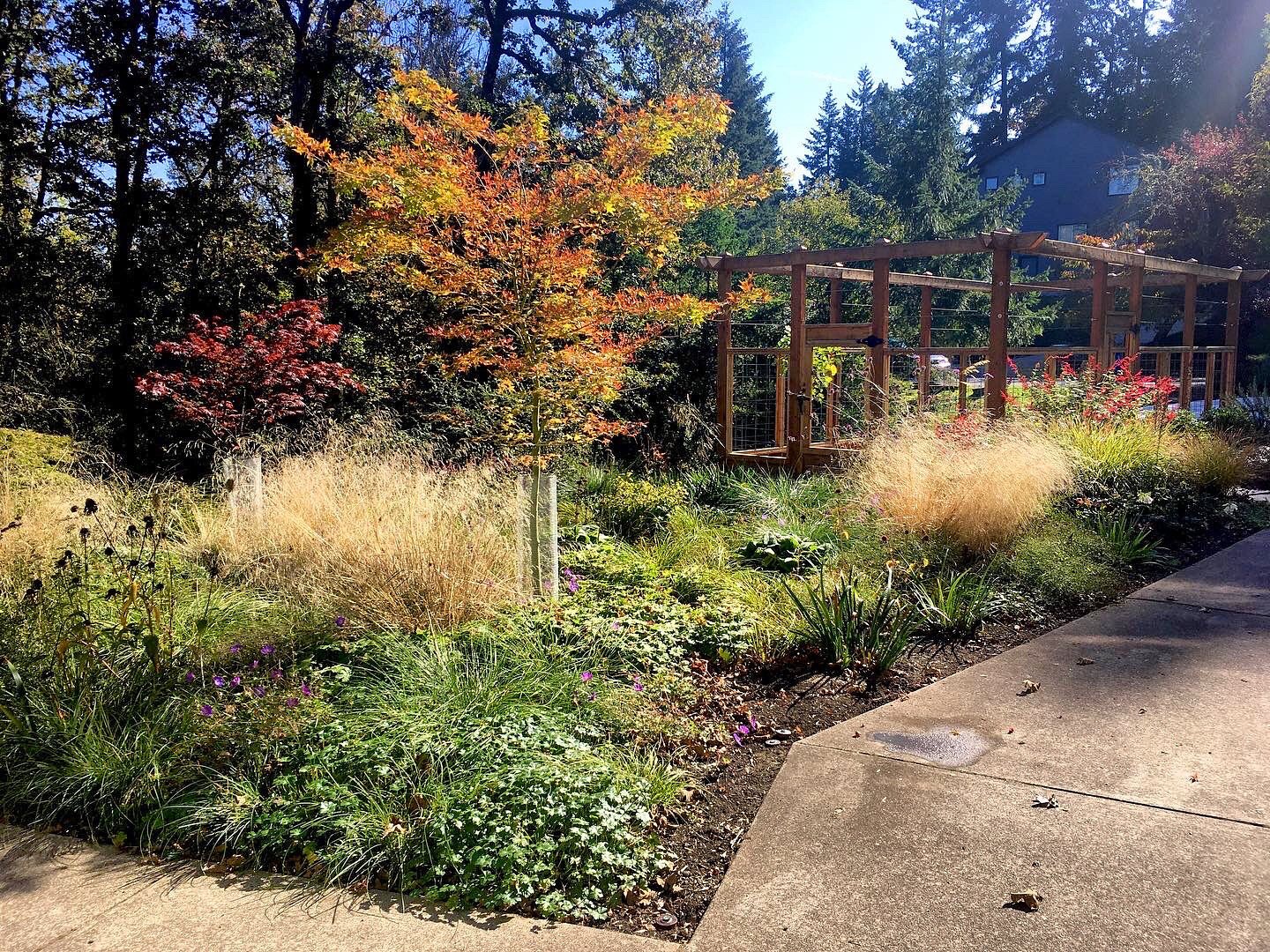
Low Maintenance Gardens – Better for Pollinators and People
Autumn 2022 “I come out every day. It’s therapy, my meditation.” Janet’s young garden transformed from overgrown, invasive plants to mostly natives. The dailiness of
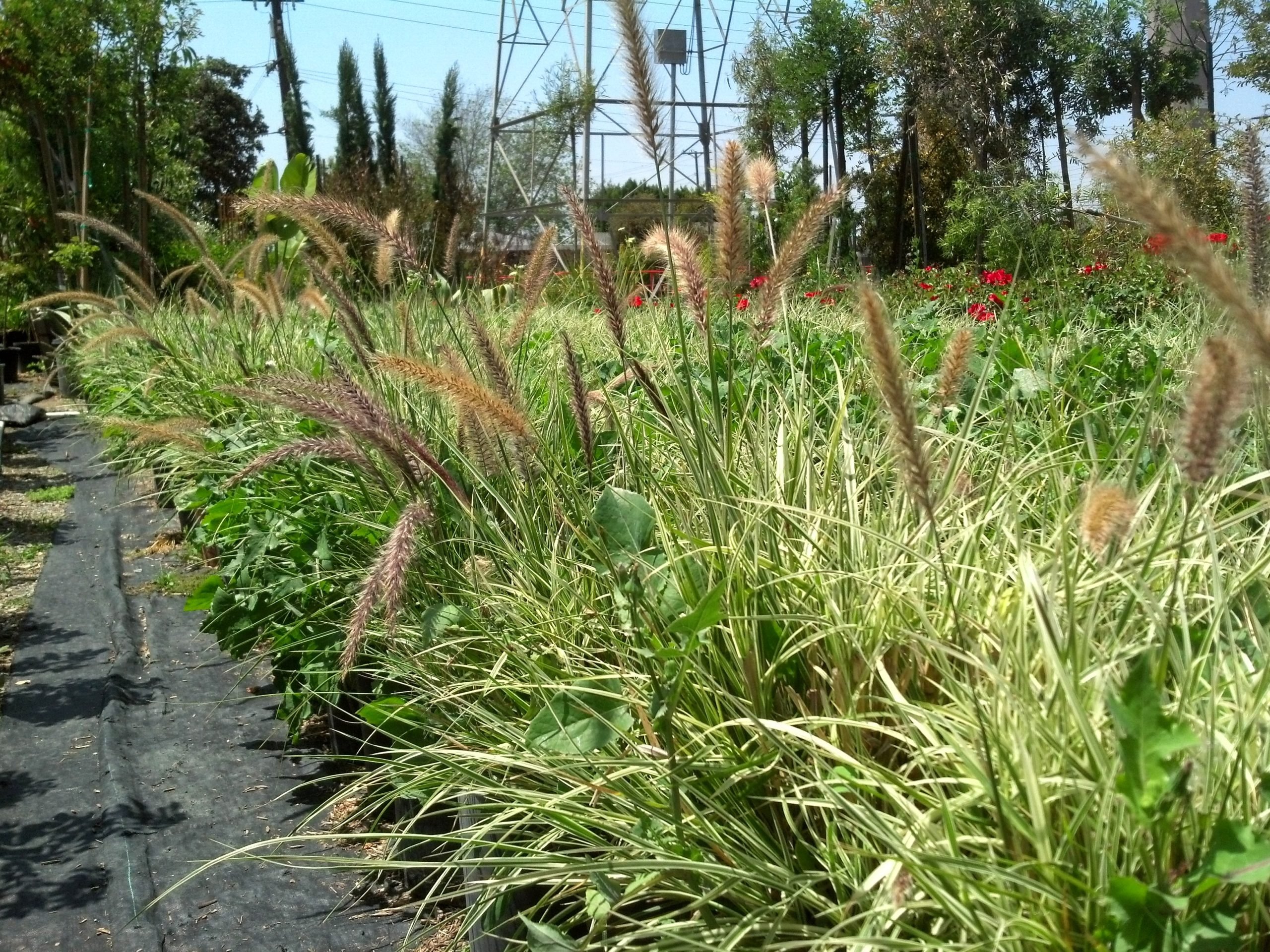
Invasive Plants Are Still Being Sold: Preventing Noxious Weeds in Your Landscape
Autumn 2022 With so many beautiful ornamental plant species and cultivars throughout California and the Pacific Northwest, how do you decide which ones to include
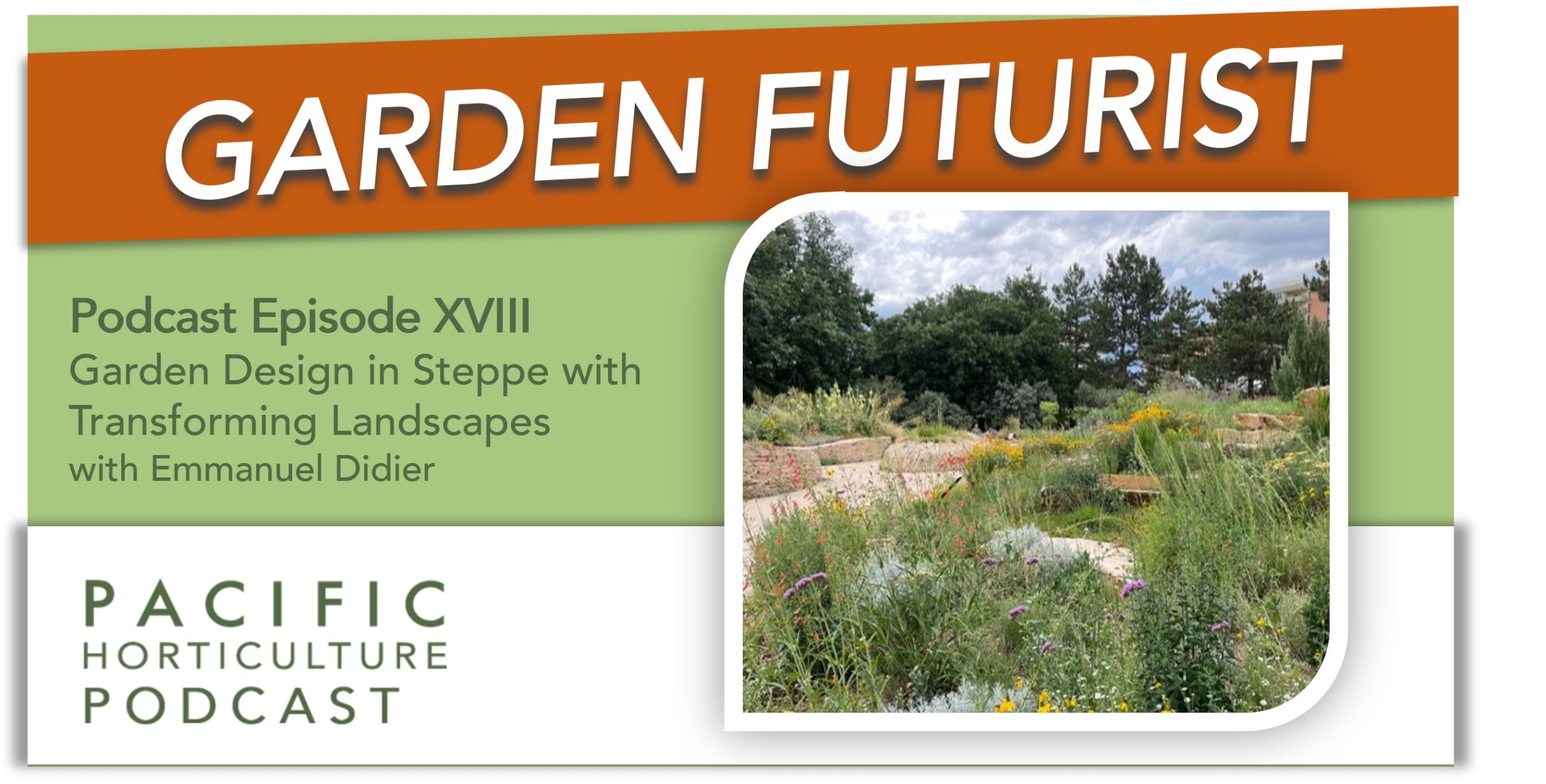
Garden Design in Steppe with Transforming Landscapes with Garden Futurist Emmanuel Didier
Summer 2022 Listen to full Garden Futurist: Episode XVII podcast here. Emmanuel Didier, Principal and Creative Director at Didier Design Studio is a leading figure
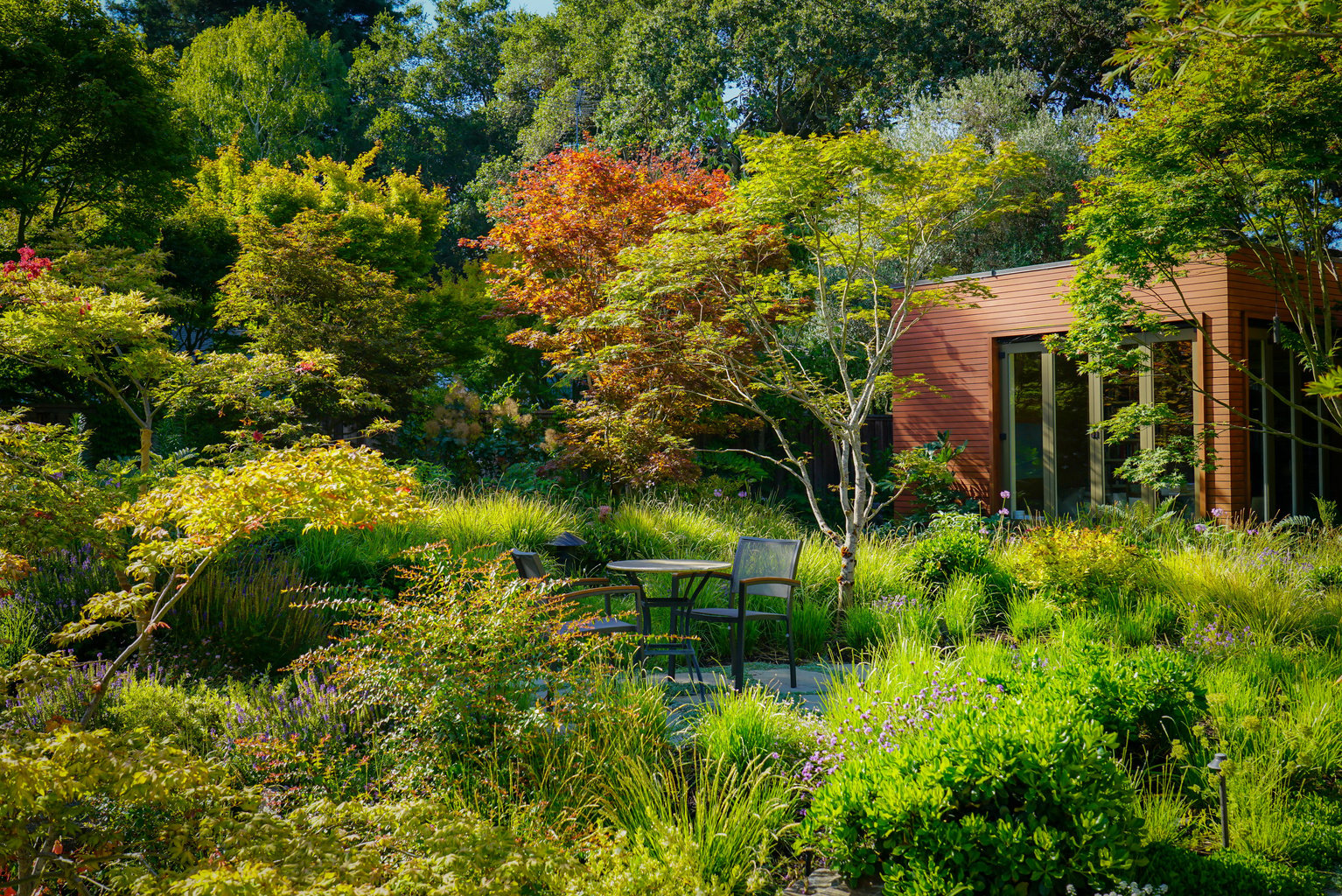
Seslerias: Versatile Groundcover Meadow Grasses
Summer 2022 Without question, the most beautiful and versatile of all the groundcover meadow grasses are the moor grasses (Sesleria). Moor grasses tick off all





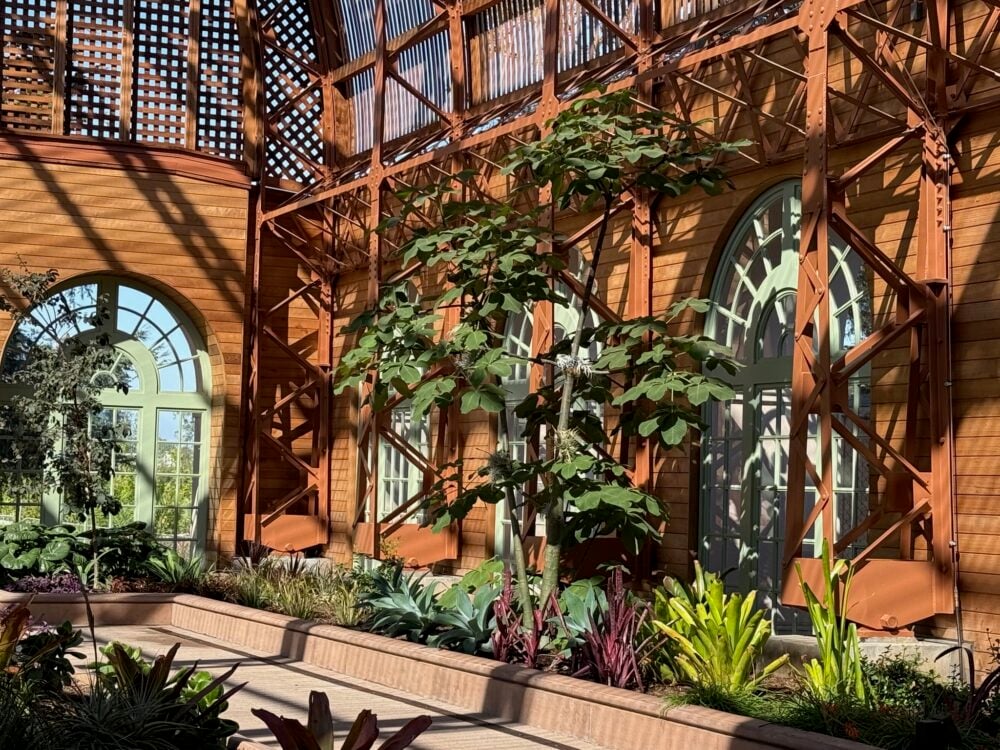



Responses